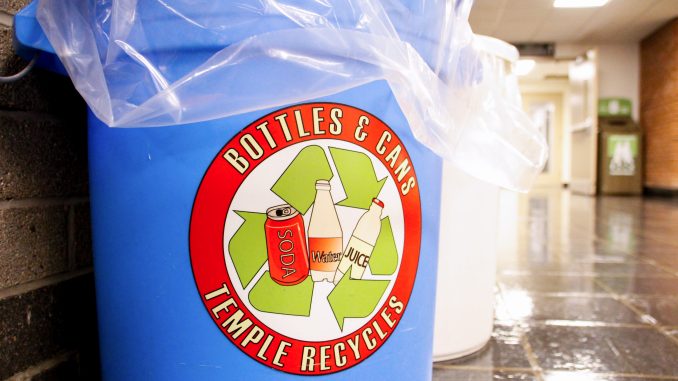
Kathleen Grady, the director of Temple’s Office of Sustainability, said the nature of her work has been “changing” since the office was created in 2008.
Grady has been developing new environmental programs, projects and competitions around Main Campus. Since last semester, the university has made steps to make on-campus buildings more sustainable.
Last summer, the university began installing new water bottle refilling stations in every building’s lobby. More refilling stations on upper floors are on the way, Grady said.
“Students don’t have to buy single-use water bottles, which helps the environment, but also helps their pocketbook,” she said.
Newer buildings — like Morgan Hall, Wachman Hall and the Science Education and Research Center — were designed to meet Leadership in Energy and Environmental Design certification, a sustainability rating system for buildings. A new “gray water” system, which uses recycled rainwater for irrigation and flushing in public restrooms in order to save water, was installed in Morgan Hall, Pearson and McGonigle halls and Montgomery Garage.
Temple is also the only school in Philadelphia that has an on-site solar-panel system, which harnesses energy for the Edberg-Olson Hall football complex on 10th and Diamond streets, Grady said.
Although older buildings can be more challenging to make sustainable, the university has started investing in ways to make the older buildings more energy-efficient, like adding the new water stations.
This semester, Grady is collaborating with Paley Library, Temple Contemporary, the College of Liberal Arts and the Division of Architecture & Environmental Design at the Tyler School of Art for a year-long program called Seeing Stories: Visualizing Sustainable Citizenship, during which artists and activists can use any platform to “help us imagine what a sustainable future would look like,” she said.
This semester’s biggest competition, RecycleMania, is an ongoing chance for Temple to compete with other schools and universities “to see who can reduce less and recycle more,” Grady added. The recycling event started on Feb. 5 and will continue until April 1. Other upcoming events include documentary screenings about the environment, giveaways from the Temple Office Supply Swap and dumpster and cardboard design competitions.
Student involvement could lead to the success of the Office of Sustainability, Grady said.
For the last two years, Kelsey Mallon, the president of the Residence Hall Association, has been working with the Office of Sustainability to make residents aware of their environmental impact. Every residence hall has one sustainability representative who organizes monthly environmental events.
Posters about energy-saving tips and recycling boxes are posted around residence halls, Mallon added. Residents are encouraged to request their own recycling bins online or trade in any recyclable materials for free reusable bottles provided by RHA.
“It’s like education, but they also get something for recycling,” said Mallon, a junior environmental studies major.
Students have various opportunities to gain “tangible experience” with sustainability, Grady said. Activities vary from planting trees with Temple Community Garden to making organic food with the Rad Dish Co-op Café to building sustainable structures, like the tiny house on Diamond Street near Carlisle.
Grady said the knowledge that students learn is essential for the future of environmental sustainability. She added that she expects them to be leaders who go on to “[spread] the word out” and create a “ripple effect” of environmental awareness.
“The biggest impact we can have is educating people on sustainability and climate change, and the roles that individuals can play in that,” she added. “Whether it’s changing their everyday behaviors or advocating for climate action.”
Grady said her mission has become more and more challenging, because in addition to raising awareness about the environment, she now helps design sustainability programs around the university. She said she aims to add “more depth” to sustainability on Main Campus.
“We have to make sure that when we talk about sustainability, it’s not just about environmental sustainability, but also about equity and social justice,” Grady said.
Quang Do can be reached at quang.duc.do@temple.edu.



Be the first to comment